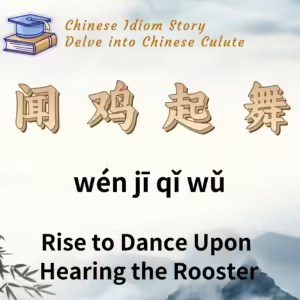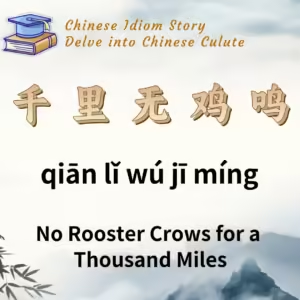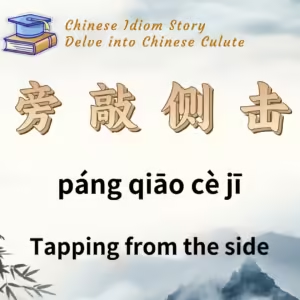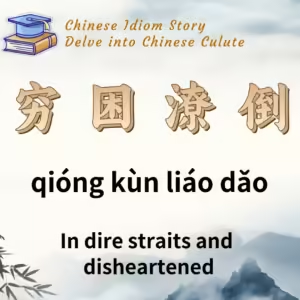
Chinese Idiom: 闻鸡起舞 (Wen Ji Qi Wu)
English Translation: Rise to Dance Upon Hearing the Rooster
pīn yīn: wén jī qǐ wǔ
Idiom Meaning: This idiom metaphorically refers to people with the ambition to serve their country who are persistent and take action. It suggests that they respond swiftly to opportunities or challenges.
Historical Source: Book of Jin: Biography of Zu Ti (晋书 · 祖逖传) and Book of Jin: Biography of Liu Kun (晋书 · 刘琨传)
Idiom Story:
During the Jin Dynasty, there was a famous poet named Liu Kun. In his youth, he lived through the tumultuous times of the “Eight Kings’ Rebellion,” which marked a period of corruption within the Western Jin royal family. Subsequently, the Xiongnu were launching frequent raids against the Western Jin dynasty, further threatening its stability.
Liu Kun harbored grand ambitions and formed a close friendship with Zu Ti, a man from Fanyang who shared his aspirations. Whenever they discussed state affairs, they would become so animated that even late at night, they would urge each other, saying, “If chaos arises in the world, we must become heroes who contend for greatness.”
One night, before the rooster crowed, Zu Ti heard some chickens cawing and woke the still-sleeping Liu Kun, urging him to practice his skills. Zu Ti then got out of bed, grabbed his sword, and began to train.
Not long after, the Xiongnu leaders Liu Cong and Liu Yao launched a large-scale attack against the Western Jin, capturing Luoyang and Chang’an. The Jin Emperor Huai and Emperor Min were taken captive, leading to the downfall of the Western Jin dynasty. In response, Liu Kun submitted a memorial to Sima Rui, urging him to establish a new dynasty in Jiangdong. In his Qianjin Biao (劝进表), he wrote, “Although disasters are frightening, they can unite the people and motivate the ruler to strengthen governance, thus revitalizing the nation.”
In 317 AD, Sima Rui declared himself emperor in Jiankang, known as Emperor Yuan of Eastern Jin. Zu Ti, with the grand ambition of restoring the northern territories, submitted a memorial to the emperor, stating, “The people remaining in the north are suffering from brutal oppression and massacre, and they wish to rise against their oppressors. If Your Majesty sends a great general to lead a northern campaign, all heroes will respond and join the cause. Even those who have allied with the enemy will recognize their errors and return to the rightful path. Thus, lost territories can be reclaimed, and the shame of the fallen nation can be erased.”
Although Emperor Yuan initially had no plans to reclaim the central plains, he could not openly oppose Zu Ti’s call for a northern campaign. He appointed Zu Ti as the General of Fendi and the Inspector of Yuzhou, providing him with a thousand rations and three thousand pieces of linen, but no armor or weapons, leaving him to recruit soldiers himself. Zu Ti then led a group across the river, swearing with a paddle as he crossed, “I, Zu Ti, will fulfill my vow to reclaim our lost territories for the nation. If I fail, I shall never return to the south again!” His words were fierce, and his solemnity moved those around him deeply.
After crossing the river, Zu Ti began smelting iron in Jiangyin to forge weapons, recruiting soldiers and training them. He subsequently marched northward, gaining the support of the people in the central plains, and won several victories against invading forces, reclaiming lost lands. However, due to insufficient trust and support from the Eastern Jin court, he fell ill from worry and died in 321 AD, leaving his ambitions unfulfilled.
This story reflects the spirit of “闻鸡起舞,” exemplifying the dedication and determination of those who strive for their country’s well-being.






